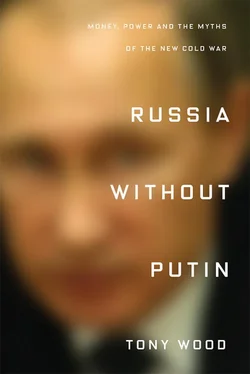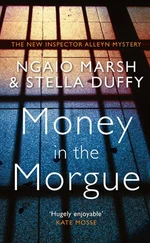The persistence of this dilemma points to the post-Soviet system’s conceptual hollowness, its inability to devise an ideological formula to fill the void left by Communism’s collapse. Yet despite this weakness, the ‘imitation democratic’ system commanded first by Yeltsin and then by Putin survived the 1990s and the first decade of the new century intact and largely unchallenged. The reasons for its surprising stability are not to be found in the personal attributes or willpower of whichever man has stood at its summit. They lie instead in the particular forms capitalism has taken in post-Soviet Russia. To understand that, we need to look more closely at the distinctive relationship between money and power that emerged in the 1990s, and at the changing character of the society over which Yeltsin and Putin have presided.
IN THE SPRING OF 2014, the US, the EU, Canada and several other countries imposed sanctions on dozens of individuals, many of them high-ranking friends of Putin, in response to Russia’s annexation of Crimea. These sanctions have been extended and renewed several times, most dramatically in the spring of 2018, after the attempted killing of a former Russian spy in the UK produced yet another diplomatic crisis between Russia and the West. Sanctions, it seems, have all but become a permanent feature of Western policy towards Russia: in 2017 the US Congress enshrined them in law, and although some European governments have occasionally made noises about revisiting the question, they, too, remain committed to sanctions for now.
The West has repeatedly used sanctions to try to force troublesome states into line – with limited success. The sanctions on Russia, like those applied to other countries, are rooted in the notion that punishing a select circle of people at the top is tantamount to disciplining the country as a whole. The individuals targeted after 2014, for example, included the Russian and Ukrainian officials who played an active role in the annexation – from high-level Kremlin operators such as Igor Sechin, a close ally of Putin, and Vladislav Surkov, the Machiavellian inventor of the term ‘managed democracy’, to the men charged with implementing Moscow’s policy on the ground in Crimea. But the sanctions list also included many private businessmen deemed to be close to the Kremlin. There were Yuri Kovalchuk and Nikolai Shamalov, the two largest single shareholders in Bank Rossiia, widely rumoured to operate as a private bank for senior Russian officials. And there were individuals known to have personal connections with Putin – and to have profited handsomely from them – such as Gennady Timchenko, whose firm, Gunvor, rapidly grew from almost nothing in 2000 to become the third-largest oil trader in the world by 2007. There were also the Rotenberg brothers, Arkady and Boris, whose construction firm won $7 billion worth of no-bid contracts for the 2014 Winter Olympics in Sochi. {1} 1 The full US list is accessible at www.treasury.gov ; The EU list is at www.consilium.europa.eu , the UK’s at hmt-sanctions. s3.amazonaws.com , with Russians listed under ‘Ukraine (Sovereignty)’. On Gunvor, see ‘Secretive Russian Gunvor becomes number 3 oil trader’, Reuters, 31 October 2007; and on the Rotenbergs and Sochi, see ‘Putin Friend Bags at Least 21 Russian Olympic Contracts’, Bloomberg, 27 March 2013.
The 2018 US sanctions focused still more closely on Putin’s inner circle, targeting his son-in-law Kirill Shamalov, as well as businessmen linked to the Kremlin such as Vladimir Bogdanov and Oleg Deripaska.
According to the logic of the sanctions, since power and wealth are highly concentrated in Russia, punishing those with personal connections to Putin is the best way to strike at the heart of the regime. Yet the belief that a handful of people wield absolute political and economic power over the country – or that it is ruled by a ‘kleptocracy’ centred on Putin {2} 2 For a rather excitable version of this argument, see Dawisha, Putin’s Kleptocracy .
– mistakes a symptom for a prime cause. Even if sanctions brought about a change in policy or personnel, they would do little to alter the underlying conditions that produced the regime in the first place. As suggested in the last chapter, the Putin system isn’t simply a corrupt, dictatorial structure imposed on a helpless population; it’s embedded in the social, economic and political fabric of the country. In other words, if we really want to understand how Russia is ruled, we need to look beyond the individuals at the summits of wealth and power to the system that enables them to thrive.
Behind the question of who runs and owns Russia lies another, larger question: what kind of capitalism has taken root there since the fall of the USSR? Just as the conventional wisdom draws a sharp distinction between the chaotic but broadly liberal political system of the 1990s and the creeping authoritarianism of the 2000s, there is a tendency to depict the Yeltsin era as representing the advance of the free market, and the Putin years as a retreat back into statism. For some observers, by the mid-2000s Russia was well on its way to becoming a ‘corporate state’ – dubbed Kremlin, Inc., since its main shareholders seemed to be largely concentrated within the medieval fortress in the capital’s heart; or else KGB, Inc., for those who felt the security services were running the show. {3} 3 ‘KGB Inc’, Economist , 20 January 2005; Nick Paton Walsh, ‘Meet the chief exec of Kremlin Inc’, Guardian , 5 July 2005; Peter Finn, ‘Kremlin Inc. Widening Control Over Industry’, Washington Post , 19 November 2006; Michael Specter, ‘Kremlin, Inc.’, New Yorker , 29 January 2007; Catherine Belton and Neil Buckley, ‘Steeled to succeed – Ivanov sets out his tough vision for Russia’s future’, Financial Times , 19 April 2007.
The Western financial press in particular saw the apparent extension of state control as an attempt to reverse the 1990s market reforms. By 2007 Anders Åslund, a former adviser to the Yeltsin government, was bemoaning the fact that Putin had ‘unleashed a great wave of renationalization’, adding that the president’s ‘chums from St Petersburg are taking over one big, well-run private company after another, turning them into less efficient state-owned firms’. {4} 4 Anders Åslund, ‘Russia’s New Oligarchy’, Washington Post , 12 December 2007.
This was no longer the familiar liberal capitalism of the 1990s, but an ugly hybrid of the Soviet planned economy and something older – ‘state capitalism’, ‘crony capitalism’, ‘neo-feudal capitalism’. {5} 5 ‘The rise of state capitalism’, Economist , 21 January 2012; ‘Putin stands by state capitalism’, Financial Times , 30 January 2012; Vladimir Gelman, ‘Russia’s crony capitalism: the swing of the pendulum’, openDemocracy , 14 November 2011; Anders Åslund, ‘Russia’s Neo-Feudal Capitalism’, Project Syndicate , 27 April 2017.
This view, though dominant, is misguided. It is based on a fundamental misreading of the relationship between the state and private capital in post-Soviet times. It assumes, in particular, that state and business are distinct realms, and that business has since 2000 been struggling to protect its legitimate terrain of activity from the clutches of an overbearing state. The standout example usually offered of this is the dismantling of Mikhail Khodorkovsky’s oil company, Yukos, and the passage of its fragments into state hands after 2003. But in fact the domains of state and business are closely intertwined, and have been since the fall of the USSR.
The best way to understand this is to look at the Russian elite – in particular, at its emergence at the end of the Soviet period, and its subsequent mutations. The story most often told is that the oligarchs of the 1990s piled up their fortunes through the rough-and-tumble of private initiative, whereas the magnates created under Putin derived theirs solely from proximity to the Kremlin. Yet the oligarchs of the Yeltsin era were always closely entangled with the state, and from the outset owed their fortunes to it. The cronyism attributed to the Putin years was central to the making of Russian capitalism long before Putin took the stage.
Читать дальше












